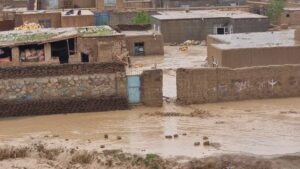MONITORING (SW) – In the first six months of the year, the International Committee of the Red Cross (ICRC) helped more than 49,500 war-wounded patients get further treatment and care in Afghanistan, said the humanitarian organization on Wednesday.
It said this figure meant an average of 270 people every day needing treatment for what are often extremely serious and painful life-changing injuries.
In Kandahar, at the ICRC supported Mirwais Regional Hospital, 2,366 weapon wounded patients have been treated during the first half of 2021 – more than double the number of patients during same period last year.
The ICRC’s physical rehabilitation and limb-fitting services registered more than 7130 new patients in the same period, an average of 40 people every day. Of those, more than 700 were people who had had a limb amputated, or on average four people a day with such a condition.
In total, the ICRC teams in 7 physical rehabilitation centres across Afghanistan have helped almost 80,000 people since January, at a time when violence in the country is rising.
“The ICRC is appealing to all parties to the conflict to do more to protect civilians from harm. The intensification of conflict related violence, growing insecurity, destruction of water or electricity infrastructures, lack of access, attacks on health facilities and health workers, are among the main issues affecting the lives of Afghans.” said Eloi Fillion, the ICRC’s head of delegation in Afghanistan.
300 civilians killed in the holy month of Ramadan
38,000 Afghan civilians killed in past 12 years
“More than four decades of armed conflict in Afghanistan have all but decimated its health care system. With COVID-19 adding yet another deadly threat, access to health care is among the most pressing humanitarian needs everywhere in the country, regardless of the political affiliation,” said Fillion.
According to the ICRC, it continues to reach out to all parties to the conflict to ensure respect of International Humanitarian Law (IHL), our call focuses in particular on the protection of civilians and civilian infrastructure – including medical personnel, facilities and vehicles – in times of conflict and violence; and to support health care to address both the consequences of armed conflict and the COVID-19 pandemic.
More than 49,500 weapon wounded patients have received treatment and care at ICRC supported 416 health facilities across the country, including those run by Afghan Red Crescent Society.
For weapon wounded patients to receive initial stabilization support prior to being shifted to the hospital, the ICRC trained more than 550 people through 42 First Aid sessions across the country.
6 hospitals under Kabul Medical University received hygiene items and personal protective equipment kits.
Together with Afghan Red Crescent Society, mortal remains of 2,449 fighters and civilians were returned and transferred to their families.
635 body bags, 65 pairs of rubber boots, 80 disposable aprons, 2,950 surgical masks among other materials donated to forensic medicine departments and morgues of provincial and regional hospitals.
More than 7,658 people in acute crisis received cash assistance to cover their essential needs.
Improved access to water for 35,700 people living in two provinces; revamped three water towers in Lashkar Gah to provide water to 9,450 people in the city; new water network installed in Jalalabad city providing 4,500 people with direct water supply, it said.
ENDS






